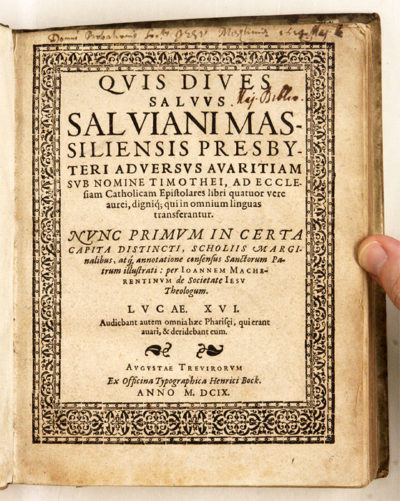– Anastasios
In our short portraits of early Christian writers, quite often we have seen most of them were dealing with theories that attacked Christianity from the outside, what we call “heresies.” When I say outside I mean “outside its orthodox doctrine,” because indeed those that put forth these theories are very often part of the Church. One of the most common sins, even if not a heresy, is the craving for money, to the extent that it becomes a god. Now, I think we need to recognize that God don’t want us to be poor in a material sense, yes, “poor in spirit,” but He does not want Christians to live a miserable life. What is the problem then? The problem is when money and wealth become an idol.
This is what comes to my mind (you will understand soon why) when thinking about Salvian (or Salvianus, 5th century), a Christian writer. We don’t have much information about his life. We know he was married and that he made, together with his wife, a vow of continence and withdrew to a monastery, got ordained there as a priest and lived as a monk. His most important work was De Gubernatione Dei, in which he addressed accusations against Christianity from pagans.
But among his other works there is also another treatise called Adversus avaritiam, against greed. In this work Salvian challenge Christians to be generous for the beauty of the house of God and to donate their wealth, before dying, for the needs of the Church. Of course something like this may be understood very differently nowadays but makes sense in the time of Salvian, when the Church was still finding a place in a society that was still strongly influenced by paganism.
Greed is a great vice and sin. Aristotle, in his book called Politics, referred to this vice: “Some persons are led to believe that … the whole idea of their lives is that they ought either to increase their money without limit, or at any rate not to lose it. The origin of this disposition in men is that … as their desires are unlimited they also desire that the means of gratifying them should be without limit. … If they are not able to supply their pleasures by the art of getting wealth, they try other arts, using in turn every faculty in a manner contrary to nature. The quality of courage, for example, is not intended to make wealth, but to inspire confidence; neither is this the aim of the general’s or of the physician’s art; but the one aims at victory and the other at health. Nevertheless, some men turn every quality or art into a means of getting wealth; this they conceive to be the end, and to the promotion of the end they think all things must contribute.”
Saint Basil the Great, in one homily, has said: “Who are the greedy? Those who are not satisfied with what suffices for their own needs. Who are the robbers? Those who take for themselves what rightfully belongs to everyone. And you, are you not greedy? Are you not a robber? The things you received in trust as a stewardship, have you not appropriated them for yourself? Is not the person who strips another of clothing called a thief? And those who do not clothe the naked when they have the power to do so, should they not be called the same? The bread you are holding back is for the hungry, the clothes you keep put away are for the naked, the shoes that are rotting away with disuse are for those who have none, the silver you keep buried in the earth is for the needy. You are thus guilty of injustice toward as many as you might have aided, and did not.” This homily of Saint Basil is certainly a great admonition for all of us, who in different measures are often impelled by our own fears and insecurities to accumulate wealth and goods just to fulfill our own greed. Certainly, we need to provide for ourselves and our dear ones. We are asked to love others as we love ourselves, so we need to love ourselves first to be able to love others. And when we have the power, we should help those in need. I think it is important not to forget that we should do so “when we have the power.” So, we need to work to assure a fair wealth for our well being and when possible to help those in need and provide also for the beauty of the house of the Lord.


 Follow
Follow


